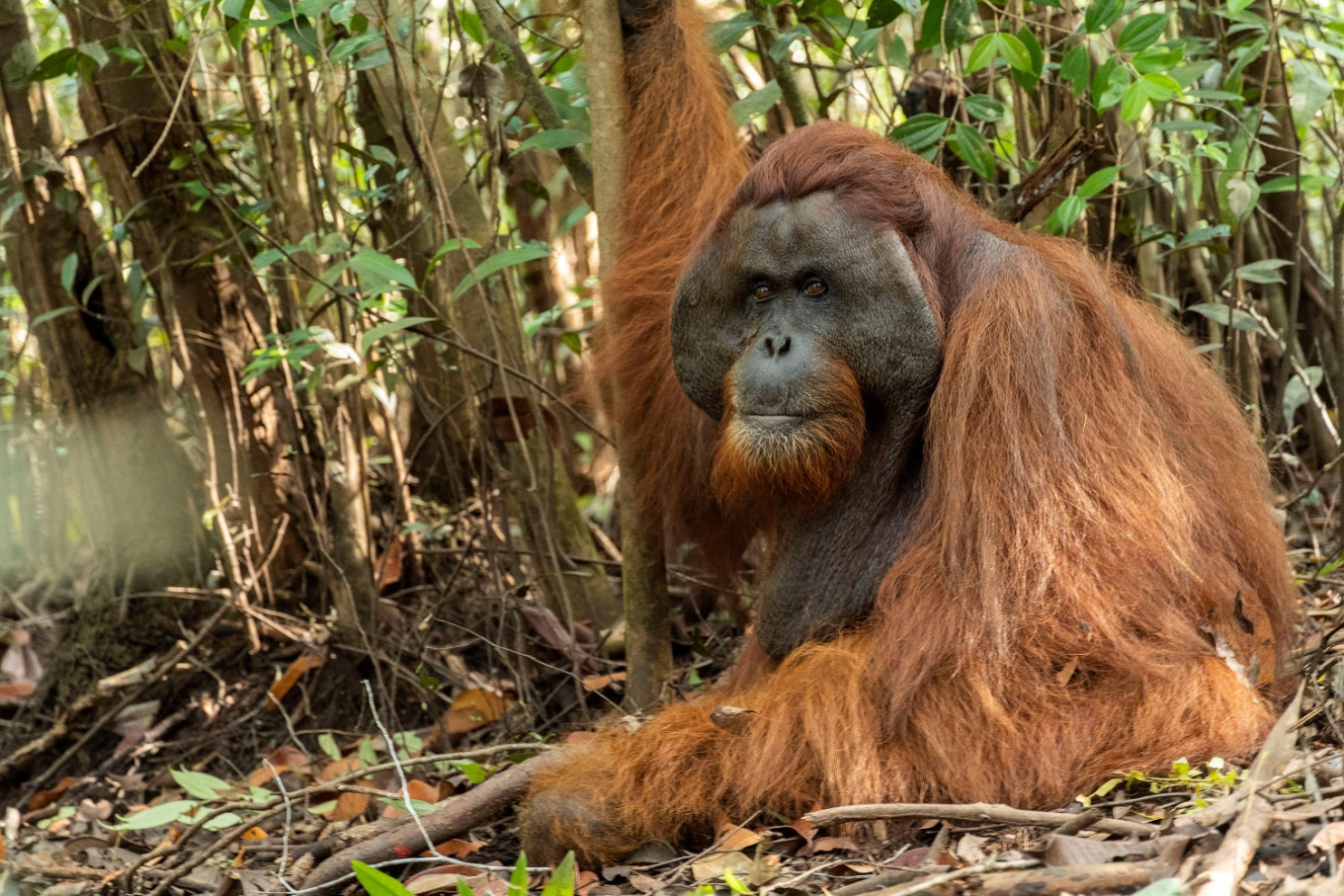Popular Reads
Top Results
Can't find what you're looking for?
View all search resultsPopular Reads
Top Results
Can't find what you're looking for?
View all search resultsOrangutan conservation needs agreement on data and trends
A wide range of scientific studies show that three orangutan species have declined in the past few decades and that nowhere are populations growing.
Change text size
Gift Premium Articles
to Anyone
W
e welcome the commentary by Indonesian Environment and Forestry Minister Siti Nurbaya on the occasion of World Orangutan Day on Aug. 19.
The Indonesian government’s recognition of the importance of maintaining orangutan habitat in state forest and non-state forest areas and protecting or restoring ecological connectivity is indeed a crucial conservation strategy for viable populations of the critically endangered orangutans.
The minister’s comment about engaging the palm oil and forestry sectors in a multi-stakeholder approach to managing remaining orangutan metapopulations in production landscapes is also spot on. Indonesia’s recent successes in reducing deforestation rates are commendable and both the government and the private sector have played important roles.
Where we differ with the minister is on her statement that “ground-based evidence confirms that Sumatran, Tapanuli and Bornean orangutans are far from extinction and instead will continue to have growing populations.” She also comments that “we must keep sight of the real ground-based and time-series evidence and not be fooled".
A wide range of scientific studies, such as “First integrative trend analysis for a great ape species in Borneo” (Nature, July 17, 2017), “Global Demand for Natural Resources Eliminated More Than 100,000 Bornean Orangutans” (Current Biology, March 5, 2018) and “Effectiveness of 20 years of conservation investments in protecting orangutans” (Current Biology, April 25, 2022), show that all three orangutan species have declined in the past few decades and that nowhere are populations growing.
This decline is also supported by surveys from the conservation department itself that show that the minimum estimated population in Central Kalimantan declined from approximately 27,387 in the latest official government orangutan population analysis published in 2016 to 23,000 now.
Thus, we underline that the extensive data to which we have access are not consistent with those referred to by the minister with the indications of “growing populations” and, as the conservation and science community has collected much of this data itself, there is no evidence that we are being fooled. The declines are real and they are well supported.
To develop insights about population numbers and trends, orangutan scientists and conservation groups have collaborated for many decades. Results from their surveys are commonly shared and are uploaded to both Indonesian and international databases, such as the A.P.E.S. database managed by the International Union for the Conservation of Nature (IUCN), which the Indonesian government can access. Population estimates and time-series are developed from these databases, and these data show declines in all three orangutan species.
Not only has the orangutan habitat shrunk significantly over the past decades, species densities in remaining forests are also declining. The logical conclusion from these data is that all populations are in decline, and for a species such as the orangutan with very low reproductive rates and thus very low population recovery potential, this means a high likelihood of extinction, thus their status as Critically Endangered on the IUCN Red List.
The minister further notes that “predictions or projections-based” approaches are unreliable. This strikes us as peculiar. All Indonesian government departments use predictions to steer their policies and practices. This includes economic predictions, poverty predictions and food safety predictions to name but a few. Such predictions are invariably based on data from the past, because, obviously, we cannot collect data from the future, therefore uncertainty is inherent in prediction. Nevertheless, making predictions about future orangutan populations makes perfect sense as it helps explore possible scenarios and thus could help steer policy change.
We agree with the minister that under the leadership of President Joko “Jokowi” Widodo, Indonesia’s rate of forest loss has very much declined. There is an excellent basis now to consolidate this achievement. Permanently locking in remaining forests in Kalimantan in the state forest zone would provide ecological security, not just for species such as orangutans and other threatened wildlife, but also for the rural communities who depend on the environmental services from these forests.
With just over 67 percent of Indonesian Borneo designated as state forest, Indonesia already exceeds the global goals of either conserving 30 or 50 percent of land, if indeed the Indonesian government would commit to retaining these areas as permanently forested and enforcing land and species protection policies.
We call on the Indonesian conservation authorities to retain trust in peer-reviewed science. In an era of fake news, we welcome constructive debate around open and transparent data.
We thus look forward to further fruitful collaboration with the Indonesian government, scientists and NGOs. We would welcome a meeting with the ministry to clarify the discrepancies and find a shared understanding on population trends.
We can share the data we have with the ministry for further forward-thinking policy decisions.
***
Erik Meijaard is managing director of Borneo Futures, Brunei Darussalam. Julie Sherman is president and director of Wildlife Impact, Portland, the United States. Marc Ancrenaz of HUTAN, Kota Kinabalu, Malaysia, Hjalmar Kühl of Max Planck Institute for Evolutionary Anthropology, Leipzig, Germany and Serge Wich of John Moores Liverpool University, the United Kingdom contributed to the article. The five have a combined 105 years of experience in orangutan and great ape conservation science.











